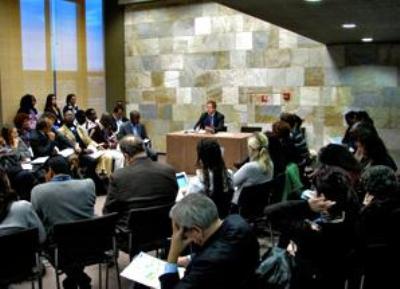| Posted: April 14 2010,05:29 |
If you wrote this report, you will find a button here that you may click
in order to make changes in the report. 
|
Postal address of organization/institution
|
c/o WFM, 708 3rd Avenue, 24th Floor
New York, NY 10017, USA
|
E-mail address of organization/institution
|
cicc@coalitionfortheicc.org
|
Website address of organization/institution
|
wwww.coalitionfortheicc.org
|
Telephone of organization/institution
|
1-212-687-2863
|
PRIORITIES: All of the organization's domains of culture of peace activity |
INTERNATIONAL PEACE AND SECURITY
|
TOP PRIORITY: The organization's most important culture of peace activity |
INTERNATIONAL PEACE AND SECURITY
|
PARTNERSHIPS AND NETWORKS: What
partnerships and networks does your organization participate in, thus
strengthening the global movement for a culture of peace? |
The
success of the NGO campaign for the establishment of a fair, effective
and independent International Criminal Court can be attributed in large
measure to the existence of strong national and regional ICC networks
all over the world. The CICC national coalitions and regional networks
are typically comprised of a diverse range of civil society groups
working within a single country or region, including NGOs, academics,
lawyers, bar associations and others. Through these networks, strategic
plans for the achievement of all goals of this campaign, in particular
ratification and implementation of the Rome Statute, and widespread
education about the Court and the Statute, are developed and carried
out.
By 2009, there were 14 national coalitions in Asia and
the Pacific, 14 in Europe, 32 in Africa, 11 in the Middle East and
North Africa, and 9 in the Americas, for a total of 80 national
coalitions.
|
ACTIONS: What activities have
been undertaken by your organization to promote a culture of peace and
nonviolence during the ten years of the Decade? If you already made a
report in 2005, your information from 2005 will be included in the 2010
report.
|
About the Coalition
The
CICC facilitates NGO access to negotiations on the ICC, including the
meetings of the Assembly of States Parties (ASP), and enables NGOs to
meet, become informed, and strategize on issues related to the Court.
The
Coalition for the International Criminal Court includes 2,500
organizations around the world working in partnership to strengthen
international cooperation with the ICC; ensure that the Court is fair,
effective and independent; make justice both visible and universal; and
advance stronger national laws that deliver justice to victims of war
crimes, crimes against humanity and genocide.
History
The
Coalition was founded in 1995 by a small group of NGOs that coordinated
their work to ensure the establishment of an International Criminal
Court. Since then, the Coalition's membership has increased
exponentially as its original goal of establishing the ICC grew to
include the larger goal of guaranteeing the Court's fair, effective and
independent functioning. Over the years, the Coalition Secretariat and
its global membership have worked together at every stage of the
Court's development from the preparatory committees for the
establishment of the Court, to the Rome Conference that established the
Court to the annual Assembly of States Parties meetings.
The
CICC secretariat has two locations, in New York and The Hague - with
regional coordinators based around the world - and is led by William R.
Pace, Executive Director of the World Federalist Movement-Institute for
Global Policy, who serves as the Convenor of the CICC. The work of the
Coalition is guided by an informal Steering Committee, which helps to
define the CICC’s goals, policies and strategies.
The role of
the Coalition was recognized by the Assembly of States Parties when it
adopted a resolution entitled ‘Recognition of the coordinating and
facilitating role of the NGO Coalition for the International Criminal
Court’ (ICC-ASP/2/Res.8) during its second session in September 2003.
When
introducing the resolution, Ambassador Allieu I. Kanu of Sierra Leone,
Vice-President of the Assembly of States Parties, remarked: "In this
journey, there are people who are generally seated on the sides or in
the back of our assemblies, those who took the floor only occasionally,
those who do not get the credit but nevertheless tirelessly sustain,
defend and yes, set the spirit of the institution which we incarnate
today. An organization that represented such people is the NGO
Coalition for the ICC”.

|
PROGRESS: Has your organization
seen progress toward a culture of peace and nonviolence in your domain
of action and in your constituency during the second half of the
Decade? |
See actions above
|
OBSTACLES: Has your organization faced any obstacles to implementing the culture of peace and nonviolence? If so, what were they?
|
not reported
|
PLANS: What new engagements are
planned by your organization in the short, medium and long term to
promote a culture of peace and nonviolence? |
Through
the concerted efforts of member groups and in cooperation with
governments and international organizations, we work toward:
• protecting the letter and spirit of the Rome Statute;
• raising awareness of the ICC at the national, regional and global level;
• monitoring and supporting the work of the Court;
• promoting ratification and implementation of the Court’s founding treaty, the Rome Statute;
• monitoring and supporting the work of the Assembly of States Parties;
• facilitating involvement and capacity building of NGOs in the ICC process; and
• expanding and strengthening the Coalition’s worldwide network.
|
GLOBAL MOVEMENT: How do you think the culture of peace and nonviolence could be strengthened and supported at the world level??
|
|
| Back to top |
|


